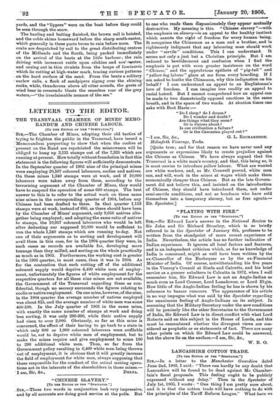"CHINESE SLAVERY."
[To TER EDITOR OF THE " SPECTATOR.]
SIE,—These two words in conjunction look very impressive, and by all accounts are doing good service at the polls. But to one who reads them dispassionately they appear mutually' destructive. my meaning is this. "Chinese slavery'—with the emphasis on slavery—is an appeal to the healthy instinct which asserts the right of freedom for every human. being. It recognises the Chinaman as a man and a brother, and is
righteously indignant that any labouring man should work under " servile " conditions. This I can - understand. It seems not only a just but a Christian principle. But I ain reduced to bewilderment and confusion when' I find the emphasis is put with even greater insistence on the word
"Chinese," and the opprobrious epithets of " pig-tail ". and "yellow-leg labour" glare at me from every hoarding. If I
am asked to loathe the Chinaman, why this indignation on his behalf ? I can understand an appeal to an Englishman's love of freedom. I can imagine less readily an appeal to racial hatred. But I cannot comprehend bow an appeal can be made to two diametrically opposed emotions in the same breath, and in the space of two words. At election times one asks with Bret Harte :— " Do I sleep ? do I dream ?
Do I wonder and doubt ?
Are things what they seem?
Or is visions about ?
Is our civilisation a failure' Or is the Caucasian played out ?"
Holmfirth Vicarage, Yorks.
[Quite true ; and for that reason we have never used any arguments or expressions likely to create prejudice against
the Chinese as Chinese. We have always argued that the Transvaal is a white man's country, and that, this being so, it
'is most unwise to introduce yellow labour. Whit are wanted are white workers, and, as Mr. Creswell proved, white men can, and will, work in the mines at wages which make them economically cheaper than Chinese. But as the late Govern- ment did not believe this, and insisted on the introduction of Chinese, they should- have introduced them, not under semi-servile conditions, and not as bondman who have sold themselves into a temporary slavery, but as free agents.—• ED. Spectator.]


































 Previous page
Previous page